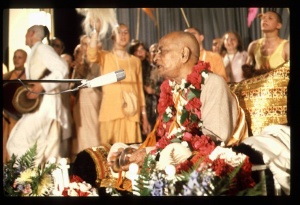SB 5.1.2: Difference between revisions
m (1 revision(s)) |
No edit summary |
||
| Line 1: | Line 1: | ||
{{info | {{info | ||
|speaker=King Parikist | |speaker=King Parikist | ||
|listener= | |listener=Śukadeva Gosvāmī | ||
}} | }} | ||
[[Category:Srimad-Bhagavatam - Canto 05 Chapter 01|S02]] | |||
[[Category:Bhagavatam Verses Spoken by Pariksit Maharaja - Vanisource|050102]] | |||
<div style="float:left">'''[[Srimad-Bhagavatam]] - [[SB 5|Fifth Canto]] - [[SB 5.1: The Activities of Maharaja Priyavrata|Chapter 1: The Activities of Mahārāja Priyavrata]]'''</div> | |||
<div style="float:right">[[File:Go-previous.png|link=SB 5.1.1]] '''[[SB 5.1.1]] - [[SB 5.1.3]]''' [[File:Go-next.png|link=SB 5.1.3]]</div> | |||
{{RandomImage}} | |||
==== TEXT 2 ==== | ==== TEXT 2 ==== | ||
<div | <div class="verse"> | ||
na nūnaṁ mukta-saṅgānāṁ | :na nūnaṁ mukta-saṅgānāṁ | ||
tādṛśānāṁ dvijarṣabha | :tādṛśānāṁ dvijarṣabha | ||
gṛheṣv abhiniveśo 'yaṁ | :gṛheṣv abhiniveśo 'yaṁ | ||
puṁsāṁ bhavitum arhati | :puṁsāṁ bhavitum arhati | ||
</div> | </div> | ||
| Line 16: | Line 22: | ||
==== SYNONYMS ==== | ==== SYNONYMS ==== | ||
<div | <div class="synonyms"> | ||
''na''—not; ''nūnam''—certainly; ''mukta-saṅgānām''—who are free from attachment; ''tādṛśānām''—such; ''dvija-ṛṣabha''—O greatest of the brāhmaṇas; ''gṛheṣu''—to family life; ''abhiniveśaḥ''—excessive attachment; ''ayam''—this; ''puṁsām''—of persons; ''bhavitum''—to be; ''arhati''—is possible. | |||
</div> | </div> | ||
| Line 23: | Line 29: | ||
==== TRANSLATION ==== | ==== TRANSLATION ==== | ||
<div | <div class="translation"> | ||
Devotees are certainly liberated persons. Therefore, O greatest of the brāhmaṇas, they cannot possibly be absorbed in family affairs. | Devotees are certainly liberated persons. Therefore, O greatest of the brāhmaṇas, they cannot possibly be absorbed in family affairs. | ||
</div> | </div> | ||
| Line 30: | Line 36: | ||
==== PURPORT ==== | ==== PURPORT ==== | ||
<div | <div class="purport"> | ||
In Bhakti-rasāmṛta-sindhu it is said that by executing devotional service to the Lord, one can understand the transcendental position of the living being and the Supreme Personality of Godhead. The Supreme Personality of Godhead cannot be understood by any means except bhakti. The Lord confirms this in Śrīmad-Bhāgavatam ([[SB 11.14.21]]). Bhaktyāham ekayā grāhyaḥ: "only by executing devotional service can one appreciate Me." Similarly, in Bhagavad-gītā ([[BG 18.55]]) Lord Kṛṣṇa says, bhaktyā mām abhijānāti: "simply by discharging devotional service, one can understand Me." Thus for a bhakta to become attached to family affairs is impossible, since a bhakta and his associates are liberated. Everyone is searching after ānanda, or bliss, but in the material world there can never be any bliss. It is only possible in devotional service. Attachment for family affairs and devotional service are incompatible. Therefore Mahārāja Parīkṣit was somewhat surprised to hear that Mahārāja Priyavrata was simultaneously attached to devotional service and to family life. | In ''Bhakti-rasāmṛta-sindhu'' it is said that by executing devotional service to the Lord, one can understand the transcendental position of the living being and the Supreme Personality of Godhead. The Supreme Personality of Godhead cannot be understood by any means except ''bhakti''. The Lord confirms this in ''Śrīmad-Bhāgavatam'' ([[SB 11.14.21]]). ''Bhaktyāham ekayā grāhyaḥ'': "only by executing devotional service can one appreciate Me." Similarly, in ''Bhagavad-gītā'' ([[BG 18.55]]) Lord Kṛṣṇa says, ''bhaktyā mām abhijānāti'': "simply by discharging devotional service, one can understand Me." Thus for a ''bhakta'' to become attached to family affairs is impossible, since a ''bhakta'' and his associates are liberated. Everyone is searching after ''ānanda'', or bliss, but in the material world there can never be any bliss. It is only possible in devotional service. Attachment for family affairs and devotional service are incompatible. Therefore Mahārāja Parīkṣit was somewhat surprised to hear that Mahārāja Priyavrata was simultaneously attached to devotional service and to family life. | ||
</div> | </div> | ||
__NOTOC__ | |||
<div style="float:right; clear:both;">[[File:Go-previous.png|link=SB 5.1.1]] '''[[SB 5.1.1]] - [[SB 5.1.3]]''' [[File:Go-next.png|link=SB 5.1.3]]</div> | |||
__NOTOC__ | |||
__NOEDITSECTION__ | |||
Revision as of 18:10, 4 May 2021

A.C. Bhaktivedanta Swami Prabhupada
TEXT 2
- na nūnaṁ mukta-saṅgānāṁ
- tādṛśānāṁ dvijarṣabha
- gṛheṣv abhiniveśo 'yaṁ
- puṁsāṁ bhavitum arhati
SYNONYMS
na—not; nūnam—certainly; mukta-saṅgānām—who are free from attachment; tādṛśānām—such; dvija-ṛṣabha—O greatest of the brāhmaṇas; gṛheṣu—to family life; abhiniveśaḥ—excessive attachment; ayam—this; puṁsām—of persons; bhavitum—to be; arhati—is possible.
TRANSLATION
Devotees are certainly liberated persons. Therefore, O greatest of the brāhmaṇas, they cannot possibly be absorbed in family affairs.
PURPORT
In Bhakti-rasāmṛta-sindhu it is said that by executing devotional service to the Lord, one can understand the transcendental position of the living being and the Supreme Personality of Godhead. The Supreme Personality of Godhead cannot be understood by any means except bhakti. The Lord confirms this in Śrīmad-Bhāgavatam (SB 11.14.21). Bhaktyāham ekayā grāhyaḥ: "only by executing devotional service can one appreciate Me." Similarly, in Bhagavad-gītā (BG 18.55) Lord Kṛṣṇa says, bhaktyā mām abhijānāti: "simply by discharging devotional service, one can understand Me." Thus for a bhakta to become attached to family affairs is impossible, since a bhakta and his associates are liberated. Everyone is searching after ānanda, or bliss, but in the material world there can never be any bliss. It is only possible in devotional service. Attachment for family affairs and devotional service are incompatible. Therefore Mahārāja Parīkṣit was somewhat surprised to hear that Mahārāja Priyavrata was simultaneously attached to devotional service and to family life.